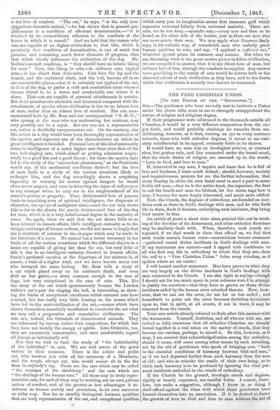THE FREE CHRISTIAN UNION.
[To THE EDITOR OF THE "SPECTATOR."]
Sur,—The gentlemen who have recently met to institute a Union under the above title, seem to me to strangely misapprehend the nature of religion and religious dogma.
If their programme were addressed to the thousands outside all Churches, it would be a very different composition from the one put forth, and would probably challenge no remarks from me.. Addressing, however, as it does, turning an eye in every sentence towards, those who hold orthodox dogmas, it seems to me curi- ously uninfluential in its appeal, curiously futile in its desires.
It would have no man rely on theological articles, or external rites, but profess only, and live contented under the broad creed, that the whole duties of religion are summed up in the words,. "Love to God, and love to man."
If, interested in any man, I inquire and learn that he is full of love and kindness, I learn much indeed ; should, however, anxiety and inquisitiveness procure for me the further information, that every Sunday he stints his own festal meal to send a part to some feeble old man,—that he is the active head, the organizer, the first to call the hands and man the lifeboat, let the storm rage how it may, I become far more deeply interested, and much more edified.
Now, the Creeds, the dogmas of orthodoxy, are founded on inci- dents such as these in God's dealings with man, and he who finds life in them, finds it because, embodying such incidents, they bring God nearer to him.
An article of yours a short time since pointed this out in treat- ing of the doctrine of the Atonement, and other orthodox doctrines may be similarly dealt with. When, therefore, such creeds are repeated, if we find words in them that offend us, we feel that such words contain human error—meretricious human ornament —gathered round divine incidents in God's dealings with man. If my statements are correct—and I appeal with confidence to all who find any life in orthodoxy to attest that they are—how the call to a "Free Christian Union" fades away voiceless, as if spoken where no air exists !
I will hazard another statement. Men have grown to what they are very largely on the divine incidents in God's dealings with. man contained in the Creeds. I am also right in saying—though, I should ask for too much space in your columns were I to attempt to justify the assertion—that they have so grown on these divine. incidents aided by the human error attached thereto. Now, how- ever, that we can see the error, its use for us has ended ; and henceforth to point out the error becomes doubtless incumbent upon us, that in spirit, at all events, if not in word, it may be removed from the creeds.
Your own article already referred to deals after this manner with the Atonement. Yourself, doubtless, and all who see with me, are. indeed so fully conscious that all orthodox Churches are already bound together in a real union on the matter of creeds, that they become too careless, perhaps, to unveil it. Be this, however, as it may, I am assured that acknowledged union among the orthodox,. should it come, will come among other means by such unveiling, not by the aid of gentlemen who speak of bringing men "back to the essential conditions of harmony between God and man," as if we had departed farther from such harmony than the men of old ; and who so mistake the cradle of their own being, as to think such harmony is to be produced by ignoring the vital per- sonal incident's embodied in the creeds of orthodoxy.
If the Church be the ground, theologic creeds and dogmas,. rigidly or loosely expressed, are needful fruits. I cannot, there- fore, but make a suggestion, although I know in so doing I shall offend against the ideas with which these gentlemen have formed themselves into an association. If it be desired to foster the growth of love to God and love to man without the aid of religions creeds and dogmas, why not choose some form of common action in which the development of these loves, far from clashing with orthodox dogmas, will manifest itself in forma secular and scientific? Why not band themselves together to cleanse St. Giles, and house properly its wretched hordes ; to provide educa- tion for the poor, or refuges for the destitute, or for any such works, and call themselves, if they please, a Union of Practical



































 Previous page
Previous page